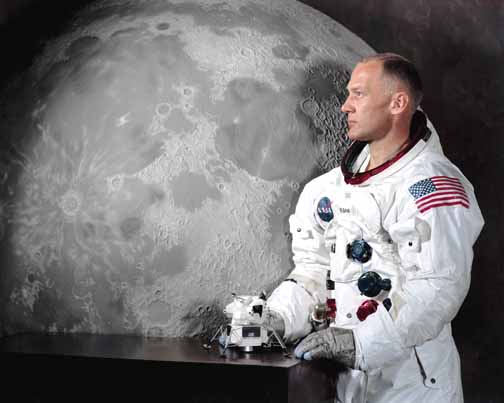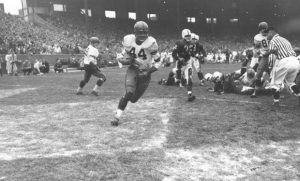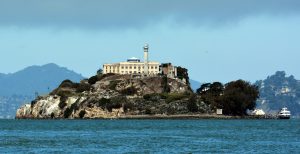July 20, 1969—a day that would go down in history, as the first humans went on to set foot on the Moon. With an estimated 530 million people worldwide watching at the time, today’s generation can recall their parents or grandparents describe the chills they felt as Neil Armstrong spoke his famous words.1 People today tend to forget that there was a second man to touch down some fifteen minutes after Armstrong: Edwin “Buzz” Aldrin, a man sometimes forgotten simply because he was not the first man on the Moon, on a mission that could have been quite capably another NASA tragedy.
The Apollo 11 Mission consisted of a crew of three men; Apollo 11 Commander Neil Armstrong, Command Module Pilot Michael Collins, and Lunar Module Pilot Edwin “Buzz” Armstrong.2 On July 16, 1969, the crew prepared to launch from Cape Kennedy in Florida. Aldrin described what he saw, as his colleagues were being strapped into the rocket. He took in the moment and the magnitude of the journey the crew was about to embark on:

“As far as I could see there were people and cars lining the beaches and highways. The surf was just beginning to rise out of an azure-blue ocean. I could see the massiveness of the Saturn V rocket below and the magnificent precision of Apollo above. I savored the wait and marked the minutes in my mind as something I would always want to remember.”3
At 9:32 a.m. on July 16, 1969, the Saturn V Rocket ignited, launching the crew of Apollo 11 towards the Moon some 238,900 miles away. Aldrin poetically describes his view of Earth from space, “The thought reoccurred that wars are generally fought for territory or are disputes over borders; from space the arbitrary borders established on Earth cannot be seen.”4
On July 20, with the ever growing Moon in sight, the Lunar Module detached from the Command Module. From here on out, Aldrin was the pilot. It was his turn to etch his name in the history of humankind.
While advancing toward the Moon’s surface, the dreaded yellow caution light came on. Being so far away from Earth, yet so close to the surface of the Moon, the astronauts’ only hope was that the malfunction wasn’t critical. “Hearts shot up into throats while we waited to learn what would happen.”5 The crew received another caution warning before being told by their flight commander back in Houston to proceed. Following the first two warnings, Aldrin and Armstrong went on to receive at least three more warnings before being reassured, once again, that the mission was still a go.
July 20, 1969 at 4:17 p.m. — Edwin “Buzz” Aldrin successfully lands Lunar Module Eagle on the surface of the Moon in Mare Tranquillitatis (The Sea of Tranquility). Command Center has been painfully waiting four long days to hear Aldrin radio the words of success: “Houston, Tranquility Base here. The Eagle has landed.”6

Edwin “Buzz” Aldrin became the second man to set a pair of footprints on the surface of the Moon some fifteen minutes after his Command Leader Neil Armstrong initially touched down. When asked about the Moon’s scenery, Aldrin described it as “Beautiful, beautiful. Magnificent Desolation.”7 The crew spent the following hours taking samples from the Moon, taking photos, and of course, planting the American Flag on the Moon’s surface.
Twenty-one hours after landing, it was time to head back to Earth. The Eagle would meet back up with the Command Module Columbia and its pilot Michael Collins in the Moon’s orbit. The crew shared a brief celebratory moment before preparing their return voyage—back towards Earth’s orbit. The crew would return to Earth eight days after launch, landing in the Pacific Ocean on July 24, 1969.8 In a stunning display of American science Buzz Armstrong, along with the rest of the Apollo 11 crew, ultimately ended the Space Race—heeding President John F Kennedy’s 1961 call to put American men on the Moon and safely return them before the decade’s end.

“And, therefore, as we set sail we ask God’s blessing on the most hazardous and dangerous and greatest adventure on which man has ever embarked.” — John F. Kennedy, September 12, 1962
- Sarah Loff, “Apollo 11 Mission Overview,” NASA, April 17, 2015. http://www.nasa.gov/mission_pages/apollo/missions/apollo11.html. ↵
- Lawrence W. Baker, Sarah Hermsen, Rob Nagel, Peggi Saari, Space Exploration Reference Library (Detriot; UXL, 2008), 178. ↵
- Edgar M. Cortright, Apollo Expeditions to the Moon: The NASA History (Courier Corporation, 2012), 204. ↵
- Edgar M. Cortright, Apollo Expeditions to the Moon: The NASA History (Courier Corporation, 2012), 206. ↵
- Edgar M. Cortright, Apollo Expeditions to the Moon: The NASA History (Courier Corporation, 2012), 212. ↵
- NASA Content Administrator, “July 20, 1969: One Giant Leap For Mankind.” NASA, February 19, 2015, http://www.nasa.gov/mission_pages/apollo/apollo11.html. ↵
- Buzz Aldrin and Wayne Warga, Return to Earth (Open Road Media, 2015), ebook. ↵
- Buzz Aldrin and Wayne Warga, Return to Earth (Open Road Media, 2015), ebook. ↵



97 comments
Sienna Guerra
I enjoyed the precise details that this article provided, and I learned how Aldrin described the Moon’s scenery as he first saw it. It is crazy how Neil Armstrong was to land on the moon, and Buzz Aldrin wasn’t really a topic of conversation after Neil Armstrong’s voice was mentioned. Congrats on best title nomination and I hope you win!
Madeline Torres
It’s very sad how Buzz Aldrin does not get the same amount recognition as Armstrong does but he definitely deserves it. No other person on Earth would have the courage to step foot on the moon despite how dangerous the mission is and Buzz was that man. Even though Buzz Aldrin was not the first man to step foot on the moon he is one of the courageous men to have done so, and his courage changed history forever. Well-written article!
Diego Aguilera
Wow 530 million watching? thats a lot and crazy! I always hear about Neil Armstrong and hardly anything Buzz Aldrin. I do think its strongly because he was the second one to step foot. Although he was the second one, I know Buzz still played a important role in the mission. Overall great article and I really like that the author keep me glued to the screen.
Sebastian Carnero
Incredible, taking men into the moon while having 530 million people watching all over the world. This meant that if things went wrong, there will be 3 deaths shown to 530 million people. It was a risky project, but it meant a great advance in science. I did not know it took eight days for them to return to earth. I wonder how spending that much time in space felt.
Lynsey Mott
The moon landing was something that was taught continuously throughout my school career. But it was really all about how Neil Armstrong was to land on the moon, and Buzz Aldrin wasn’t really a topic of conversation after Neil Armstrong’s voice was mentioned. So I do believe he needs more recognition. He was on the same team, and They all were in the space together, marveling at how they accomplished something no American had done.
Enrique Segovia
I liked this article because it embraces the excitement that everyone had during the launch of the Apollo 11, which put an end to the Space Race against the Soviet Union. I think the name of Buzz Aldrin is undermined when talking about the Apollo 11 mission, since most people only know about Neil Armstrong- the first man to ever step on the Moon. I enjoyed the precise details that this article provided, and I learned how Aldrin described the Moon’s scenery as he first saw it.
Adam Portillo
Wow what an awesome article. I was engaged during the whole time I read the article. The mission to the moon was surely one of mankind’s greatest accomplishments. For me both Buzz Aldrin and Neil Armstrong our heroes and it doesn’t matter who stepped on the moon first. Buzz Aldrin should definitely get more recognition because of the job that he was given.
Montserrat Moreno Ramirez
I can only imagine the fear, the happiness and the excitement they went through. It was a historical moment that will be talked about for hundreds of years. Everybody knows Neil Armstrong, but no one really talked about Buzz Aldrin. This was a teamwork and its kind of sad that for such amazing thing just one person is remembered for it.
Great article and very well written. Really engaging and interesting history!
Diego Aguilera
Wow 530 million watching? thats a lot! I always hear about Neil Armstrong and hardly anything Buzz Aldrin. I do think its strongly because he was the second one to step foot. Although he was the second one, I know Buzz still played a important role in the mission. Overall great article and I really like that the author keep me glued to the screen.
Micaela Cruz
I strongly feel that Buzz Aldrin is not given enough credit, credit that he truly deserves. It was fascinating to learn how it was in fact him who not only was the pilot but also the one to land Lunar Module Eagle on the moon. He contributed quite a bit while on this space expedition but we so often pay homage to Neil Armstrong since it was he who first walked on the moon that Aldrin did not receive much appreciation. I also feel that this article does indeed give much needed thanks to Aldrin and for his contribution to the Apollo 11 mission.